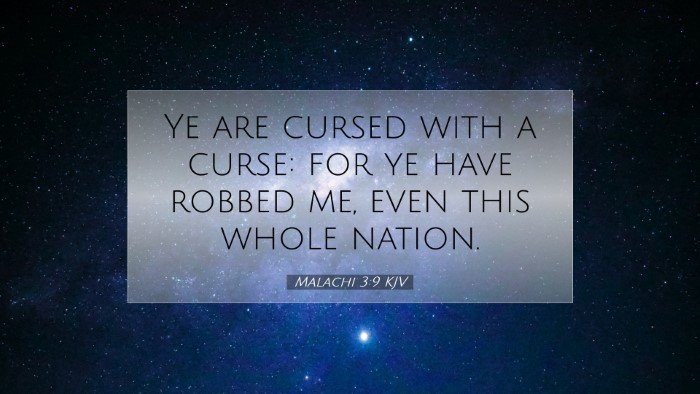Old Testament
Genesis Exodus Leviticus Numbers Deuteronomy Joshua Judges Ruth 1 Samuel 2 Samuel 1 Kings 2 Kings 1 Chronicles 2 Chronicles Ezra Nehemiah Esther Job Psalms Proverbs Ecclesiastes Song of Solomon Isaiah Jeremiah Lamentations Ezekiel Daniel Hosea Joel Amos Obadiah Jonah Micah Nahum Habakkuk Zephaniah Haggai Zechariah MalachiMalachi 3:9
Malachi 3:9 KJV
Ye are cursed with a curse: for ye have robbed me, even this whole nation.
Malachi 3:9 Bible Commentary
Commentary on Malachi 3:9
Verse: "Ye are cursed with a curse: for ye have robbed me, even this whole nation."
Introduction
The verse in Malachi 3:9 presents a vital reflection on the nature of covenant relationship between God and His people. The admonition contains a fundamental principle regarding the proper practice of worship and stewardship. This commentary synthesizes insights drawn from public domain commentaries by Matthew Henry, Albert Barnes, and Adam Clarke, to aid pastors, students, and scholars in unpacking its theological implications.
Contextual Analysis
Malachi, the last of the Minor Prophets, addresses the spiritual malaise of Israel after the return from the Babylonian exile. The people of Israel, having witnessed God’s faithfulness, were nonetheless in disobedience, particularly regarding tithes and offerings.
- Historical Background: The Israelites had returned to their land and were expected to restore proper worship practices. However, neglecting their obligations led to spiritual decay and a disconnect from God.
- Literary Structure: Malachi employs a covenantal framework, highlighting God's enduring love and the people's failure to respond appropriately.
Textual Analysis
The phrase "Ye are cursed with a curse" signifies a weighty divine pronouncement. This introduces a clear correlation between disobedience and curse, a motif found throughout Scripture.
- The Nature of the Curse: Matthew Henry notes that this curse is not merely punitive but is indicative of a depriving of blessings, highlighting consequences on the community-level.
- Robbing God: Albert Barnes explains that robbing God occurs when the faithful neglect their responsibilities in giving, which has eternal ramifications on their relationship with Him.
- A National Issue: Adam Clarke emphasizes that this transgression was not an individual matter; it affected the whole nation, showcasing corporate accountability in spiritual practices.
Theological Implications
Malachi 3:9 underscores several theological themes that are pivotal for understanding God's character and human responsibility.
- Stewardship and Worship: The call to give is not merely about finances but an act of worship reflecting one's allegiance and trust in God. Pastors and theologians should emphasize the theology of stewardship in light of this verse.
- God's Justice and Mercy: The curse serves as a warning of divine justice while also beckoning the people towards repentance and restoration. It reflects the dual nature of God's holiness—seeking justice while inviting mercy.
- Covenantal Faithfulness: The verse illustrates the weight of divine expectation within the covenantal framework, urging believers to remain faithful and responsive to God's commands.
Application for Today
Interpreting Malachi 3:9 offers contemporary believers a reflection point on their financial practices and spiritual health.
- Personal Reflection: Individuals and congregations should examine their stewardship and question whether they are honoring God with their resources.
- Corporate Accountability: Churches and ministries might benefit from a communal approach to stewardship, ensuring all members understand their vital role in supporting the body of Christ.
- Encouragement to Repentance: The call to action is toward repentance, encouraging believers to turn towards faithful giving as an act of worship rather than compulsion.
Conclusion
Malachi 3:9 serves as a poignant reminder of the covenant relationship believers have with God. The insights drawn from historical context, textual nuances, and theological reflections indicate that failure to fulfill one’s obligations can lead to significant spiritual consequences. The call to action in this verse is not merely to avoid a curse, but to embrace a life of faithful stewardship that brings glory to God and blessings to His people.


